- Home
- Stephen Hunt
Foul Tide's Turning Page 9
Foul Tide's Turning Read online
Page 9
Sheplar had only recently made sure that Cassandra Skar was bedded down for the night, secure in the storeroom with fresh gask sentries posted at either end of the pod’s corridor, when he saw Kerge heading towards him on the swaying walkway. Night had fallen and the freezing wind whistled in between the trees. It scoured his face, but was unable to penetrate his thick, warm flying jacket. To a layperson, the wind might have sounded like the gusts that roared through the mountainous crags of Rodal, creating twinges of homesickness; but Sheplar was not such a man. He knew each wind by the hundreds of titles his people gave them, and he could name their associated wind spirits, too. This one was Thagyang, the winter forest gusts of the gasks which spoke of iced needles and brittle leaves. Its soft song held few memories for Sheplar, even though the wind’s touch was as cold as those in Rodal.
Sheplar stopped on the walkway and bowed to Kerge. ‘No further messages from the council?’
‘In all likelihood, we will loiter here for the rest of the week before a decision is made,’ said Kerge. ‘But I carry more auspicious news. A party of riders has travelled down from Rodal and been billeted in the halls of Travellers’ Tree.’
‘Riders?’ said Sheplar, ‘We are long outside the trading season. Who rides through deep snow?’
‘They are not merchants. I believe they are a government party travelling to Arcadia through the Deep-heart Road.’
Now Sheplar was even more confused. The dignitaries described by Kerge shouldn’t be riding down from the heights and cutting through the forest at all. Why weren’t they flying to Weyland’s capital? ‘You are certain they are Rodalians? Remember Carter’s warning … the king’s agents are abroad, looking for the bumo.’
‘We recognize Rodalians down from the mountains well enough. These guests are most assuredly of your nation, not enemies masquerading as friends.’
They crossed the walkways between the trees, passing on to larger structures as they walked toward the heart of the gask city – ornate wooden bridges flanked by flickering orange lanterns and elaborately carved palisades. Every now and then they would come across scenes from gask history carved in the wood, but most of the bridges were covered with ornate mathematical script – seas of tightly nestled characters rendered abstract by their density. Sheplar knew the oil burning inside the lamps came from the forest’s flame trees; a slightly nutty scent to it that he would forever associate with the gasks. Even as the aerial streets grew crowded with gask families taking the evening air, there was a peace to the city which would have been entirely absent from even the smallest of Rodalian mountain villages. Gasks moved quietly and serenely at an even pace, never raising their voices, never jostling or running. No jabber, no songs, no shouting or raucous laughter. It was like living inside a wind temple where the monks had taken a collective vow of silence. Travellers’ Tree was one of the higher, ancient trees standing at the city’s centre, its length covered in hall-sized pods, a thick crown of branches at the top raised out to the sable star-lit sky above. Hundreds of windows glowed there in the dark, oblongs of luminescent green attracting swarms of glowing insects around its false, artificial light. They faced a long climb up spiral stairs to reach the chamber where the guests from the mountains were being entertained. Sheplar was accustomed to long climbs in the peaks, though, and his muscles ached only slightly by the time Kerge indicated they had reached the correct pod. Inside, a gaggle of human travellers stood around circular tables covered with dried fruit, vegetables and jugs of honeyed goat’s milk. Sheplar recognized some of the gasks’ council members among the mingling locals. The visitors had taken off their heavy, padded winter travelling coats and stood in familiar tunics and trousers. They certainly looked like Rodalians. Sheplar peered closer. There was a woman there, her back to him, but it looked like …
Then she turned around as though sensing his eyes on her spine. ‘Sheplar!’ she cried.
Sheplar’s heart leapt at the sight of the familiar soft porcelain skin, ethereal cheekbones and wide brown eyes offset by sweeps of long ebony hair. After all this time. To meet her here! It was true then. This was a genuine party of officials from his homeland taking a short-cut through the great forest.
‘Nima,’ said Sheplar. ‘It has been many years.’ He reached out to indicate the white belt that bound her tunic. ‘You still do not wear the black sash of marriage.’
‘Nor do you,’ said Nima. She tugged self-consciously at her pale belt, tied around a brown single-breasted leather tunic, large white buttons glittering like moonstones, baggy red russet trousers flowing around her legs as she leaned forward, almost close enough to touch.
‘Border airfields do not see many marriage festivals,’ said Sheplar. ‘Only hard landings and cold patrols.’
‘The same could be said of embassy postings,’ said Nima.
‘Of all the people I have known, it is you who most deserve happiness.’
‘Better the sorrows of being apart from the right man, than the sorrows of being alongside the wrong one.’
Sheplar said nothing to that. There was little he could say. In their sorrow, as with so much else, they were as one.
‘Until recently I had feared you dead on distant soil,’ continued Nima. ‘I heard you single-handedly engaged the fighter squadrons from a skel carrier in Northhaven’s skies, were downed, and then disappeared, far-called, to chase your honour.’
‘You heard the truth. But I have returned alive.’
She smiled and it almost melted his heart. ‘That much I know. You are the reason we travel south.’
‘I am?’ His surprise at her words verged on shock. ‘Me?’
‘Well, more accurate to say, the man you freed from his existence as a slave … the one who now claims himself a prince. His appearance is the cause that drags us south.’
‘Owen Hawkins? It is no claim … he is the rightful heir to Weyland’s throne. Owen’s uncle is little better than a usurper. The uncle arranged for Owen and his brothers to be assassinated, but one of their killers took pity on the children and sold them on to skel slave traders instead. Owen grew up inside the sky mines – a hellish education I would not wish on my worst enemy. He was the only one among the royal family who survived.’
‘So you say. We go south to the capital to help their court and national assembly adjudicate that claim. Many of the countries of the Lancean League dispatch diplomats, now. We all fear a civil war that may drag league members into the conflict on one side or the other.’
‘But you travel to Arcadia by horse?’ said Sheplar, trying to mask his astonishment. ‘Why do you not travel by flying wing?’
‘We only journey as far as Northhaven by horse,’ said Nima. ‘There we will test the newfound skills of Weyland’s pilots and engineers on one of their aircraft at the new airfield.’ She saw the quizzical look that appeared on Sheplar’s face. ‘Have you not heard? Our skyguard’s patrols are no longer required now that Weyland has an aerial force of its own. Rodal has been forbidden to overfly Weyland territory.’
Sheplar was outraged. ‘It seems I have lingered in the gasks’ forest too long. Such news is shameful! Our two countries have worked together to honour the self-defence pact of the Lanca for as long as the mountains have stood. Are we simply to be banished from the air here, like an old hound whose master has acquired a new pup?’
Nima shrugged. ‘It seems we currently have our air and their air. Even the merchant carriers that cross Weyland’s skies are expected to pay duties on their cargoes, now that King Marcus has discovered the means to dispatch fighter planes up to the clouds to extract fresh taxes.’
Sheplar growled in despondency. If a state was a body, then the world’s caravan routes were its veins. You blocked them at your peril. It seemed King Marcus had grown arrogant enough to think his secret alliance with the empire could sustain his nation in isolation. Trouble in Rodal’s neighbour would eventually spill over into the fresh air of Sheplar’s beloved, high homeland, given enough time.
&nb
sp; Nima still read his body language well. ‘I feel the same way, Sheplar. But as one of the ambassadors to Weyland, I must arrive with a clean mind.’
‘Better you arrive with a sharp sword than a clean mind,’ said Sheplar. ‘The usurper is Nyenkha, the false wind. He pretended to assist the expedition to rescue Northhaven’s snatched citizens, but ordered his guardsmen to murder everyone in the party when we reached foreign soil.’
‘Predictable,’ said a voice behind him. ‘For a skyguard to counsel aggression. A hammer perceives all problems as nails.’
Sheplar spun around to discover Palden Tash himself, the first speaker of Rodal. Sheplar bowed as custom and honour demanded, even as his joy at discovering Nima shrivelled. He told himself that he bowed to the position, not the man, before he corrected himself of such unworthy thoughts. Palden wears his animosity like an old cloak, pulled close by habit and routine. ‘First speaker. Matters must be grave indeed if you travel down to our ally’s capital.’
‘They are,’ said Palden. ‘And it also predictable that an ill wind should be preceded by a member of the Lesh family.’
‘I followed my honour.’
‘And look at what you found. Trouble at best, war at worst. But I expect the skyguard will welcome any chance to fly at an enemy, even one we should be calling friend.’
‘I am a true friend of Weyland,’ said Sheplar.
‘What are you doing here, Sheplar Lesh?’ demanded the first speaker. ‘Skulking away among the forest people? Is this a voluntary exile for you, for I know that I have not banished you yet?’
‘You might say that I am staying out of the reach of King Marcus,’ said Sheplar. ‘For I understand he is not best pleased that we returned with a member of his house with stronger claim to the throne than he.’
‘Then at least one good thing has come out of this foul business,’ announced Palden. He turned to Nima. ‘You are not to converse with this man again while we remain in the gask city.’
‘I am an ambassador!’ protested Nima. ‘I have rank, mind and a will of my own.’
‘I do not command you as first speaker,’ said Palden Tash. ‘I order you as head of your family and as your father. There is still dgra shalen between the Tash and the Lesh, and that is a law I will not allow you to flout.’
Sheplar despaired. Dgra shalen, the Rodalian code governing feuds. Always it came down to that. Where opposing families were required to remain at a distance in the claustrophobic mountain holds, lest their meetings break out in disharmony and ultimately, violence and pain for their society. ‘I carry no enmity towards your clan, First Speaker.’
‘The same could not be said of your father, when he lived. Or your grandparents or your uncles and aunts and countless cousins that breed like hares on the lower slopes.’
‘My father gave his life for Rodal, fighting in the skyguard.’
‘That he did. But where you find a Lesh on one side of an argument, you will find a Tash on the other. It has almost become a law of nature among the peaks, the spirits’ own command.’
‘It is the folly of men, not the will of the spirits, which gusts in the chasms between us,’ said Sheplar.
‘You speak well,’ said Palden. ‘But then, the blood of politicians and orators courses through your veins as strongly as it does through ours. Always on the opposite side of the council, naturally. Remain here in the shadows of the forest, Sheplar Lesh. And stay away from Nima. We shall be gone soon, to help ease the ruptures your foreign misadventures have caused. Let there be a fast return to serenity and the natural order of things.’
And of course, the natural order of things was an unbridgeable chasm between himself and Nima. Kerge headed back towards Sheplar as Nima and her cantankerous father moved away. ‘I overheard a little of what passed there. You have my apology, manling. I thought that meeting your people might bring you some small measure of happiness. It cannot be easy, remaining apart from your home and your countrymen.’
‘There are no shadows without sunlight,’ sighed Sheplar. ‘You have nothing to apologise for, Kerge. Our two families have been tossing stones in anger at each other across the heights of Rodal for a very long time.’
‘You know the womanling well?’
‘We were tutored in the same wind temple together. She is the best of them.’
‘May her embassy bring the peace which was talked of.’
‘You were held by the Vandians as a slave,’ said Sheplar. ‘Do you think peace is likely?’
‘I can no longer see the branches of the future,’ said Kerge. ‘I have my own theories as to why that is.’
Sheplar cursed himself for not remembering the gask’s troubles. ‘I misspoke.’
‘You did not, manling. My theory is that my talents have fled me because of what the future holds. Every potential branch in shadow. Every branch. And I can no longer bear to see it. Not after the horrors of working inside the sky mines. All I desire to watch now are the meadows between the trees. Is that too much to ask?’
‘After what we’ve been through,’ said Sheplar, ‘I think it is not. But it may not be wise to wish for warm winds in winter.’ Sheplar had no wish to linger further here among his countrymen; not with Nima’s presence to remind him why remote skyguard postings, journeys to distant Vandia and gask forests were not half as hard as remaining in Rodal would have been. He and Kerge exited the hall and were climbing down the spiral stairs around the trunk of Travellers’ Tree when a tall adult gask wearing the green robes of a ranger came sprinting up towards them. At close range, Sheplar recognized his features. It was Slell, head of the local ranger force.
Halting, the gask drew a quick breath to recover from his dash, then spoke. ‘The Vandian womanling has gone!’
Sheplar spoke first, his heart racing. The shock announcement had driven all brooding thoughts of what might have been, what should have been with Nima, out of his mind. ‘Where?’
‘Into the deep forest. We track her using wood-sign, but with nightfall we are blind to many of the traces of her passage.’
‘Are her guards safe?’ asked Kerge.
‘They live, if in deep embarrassment. It seems she stole a cutting tool and quietly sawed through the bonding agent of the floor, before using the tool as a climbing axe to assist her descent. Her tree leaks sap from bark cuts all the way to the glade floor. The guards only realized she was gone when they entered her room to clear away her empty supper bowl.’
‘Can you not use your future sight to see where she will run?’ asked Sheplar.
The ranger snorted at his ignorance and Kerge explained. ‘Individual will is too strong to predict in the short term with any accuracy. Her potential escape paths lie north, east, west and south.’
‘So she could be anywhere.’
‘Correct,’ said Kerge.
‘But she still has a weight in the world,’ said the ranger. He descended the stairs as he talked, Sheplar and Kerge following, all the way down to the distant forest floor. ‘And to those whose fate she is bound to, her presence in the numbers may be felt.’ He looked meaningfully at Kerge. ‘That is the reason I came here, rather than following my nose with my brothers in the forest.’
There was real pain in Kerge’s voice as he answered. ‘Have you not heard, Slell? My golden mean has been poisoned, my talents withered to darkness. We might as well let the womanling run, for both she and I will likely be cast out of the forest by the end of the week.’
‘I have heard what you suffer from,’ said the ranger. ‘But I do not believe it. I knew your father well, Kerge. I counted him as my friend. He always believed you were to be the greatest of the gift-chosen. As did many of us. Was he wrong?’
‘My father is dead,’ murmured Kerge. ‘He died to free me, our luck depleted. I miss him so much.’
‘Spare me your self-pity,’ said the ranger, brusquely. ‘Do not smother your gifts with doubt. Give me a landmark to track towards. You have at least a chance of getting it right. Your fate and the w
omanling’s are joined together; she snatched you and you in turn took her, your numbers fused heavy on the weave of the world. Now, where does her weight roll?’
‘There is bad blood between us,’ moaned Kerge.
‘It is not blood you wade though,’ snarled the ranger, ‘it is life. I am not asking you to predict future potentials, only to feel for the bindings where your fate has become mutually entangled. Do not think. Do not doubt. Don’t you dare reach for your calculator and cloud your perceptions with sums. Just reach for her presence and tell me …’
Kerge groaned as though he had been wounded in battle, but at last he spoke. ‘The bridge across Byberry Brook.’
‘East?’ said Slell. ‘Clever of the young womanling, then. The initial wood-sign led west, but I suspected it might be a false trail. She has been well trained. She flees for the deep-woods before changing direction towards a manling settlement beyond our boughs.’
‘I might be wrong,’ said Kerge. ‘I probably am. Please do not trust my instincts.’
‘I trust them more than you do,’ barked the ranger. Slell raced off, and Sheplar and Kerge followed fast after the gask as he called his remaining group of trackers to him; all tall, wiry rangers who moved through the trees effortlessly, slipping through the dark undergrowth like ghosts.
‘She must be retaken unharmed,’ said Sheplar, feeling like an inelegant bull crashing through the forest in comparison to the locals. But this was not his realm. His sense of smell was a fraction of the gasks’, and their eyes could peer far further through a dark forest twilight.
‘We shall do our best,’ said Slell, not even glancing at the aviator as he ran. ‘But her instinct for resorting to violence will be vented more readily than those of gask-kind; she’s spirited, even given her common pattern flesh. No offence intended.’
‘None taken,’ said Sheplar, ducking a thorny bush heading straight for his face.
‘You only have to watch how the womanling prowls around the halls of Quehanna, how she holds her balance on her heels. She works to conceal it, but you only need to look at her to know that she’s been hard-tutored in the ways of killing.’

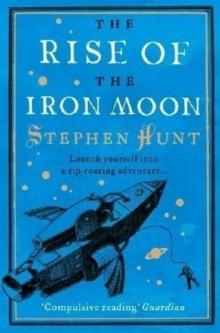 The Rise of the Iron Moon
The Rise of the Iron Moon Empty Between the Stars (The Songs of Old Sol Book 1)
Empty Between the Stars (The Songs of Old Sol Book 1) From the Deep of the Dark
From the Deep of the Dark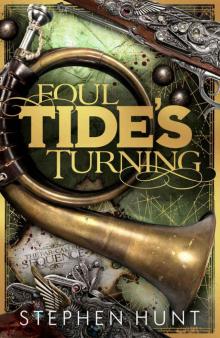 Foul Tide's Turning
Foul Tide's Turning Transference Station
Transference Station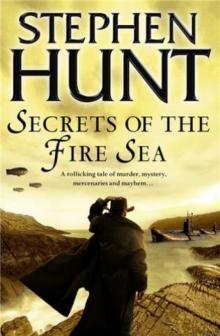 Secrets of the Fire Sea j-4
Secrets of the Fire Sea j-4 Void All The Way Down: The Sliding Void Omnibus
Void All The Way Down: The Sliding Void Omnibus The Kingdom Beyond the Waves j-2
The Kingdom Beyond the Waves j-2 From the Deep of the Dark j-6
From the Deep of the Dark j-6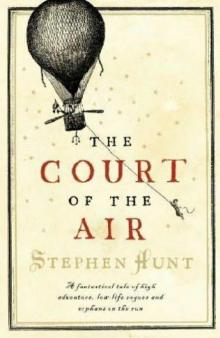 The Court of the Air
The Court of the Air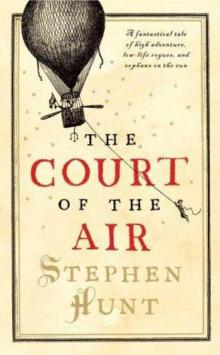 The Court of the Air j-1
The Court of the Air j-1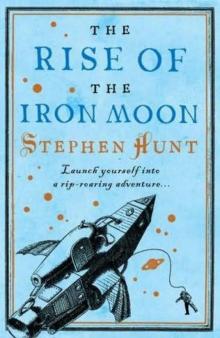 The rise of the Iron Moon j-3
The rise of the Iron Moon j-3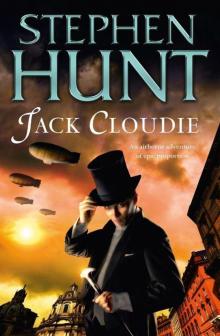 Jack Cloudie j-5
Jack Cloudie j-5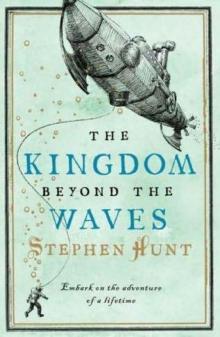 The Kingdom Beyond the Waves
The Kingdom Beyond the Waves The Stealers' War
The Stealers' War In Dark Service
In Dark Service